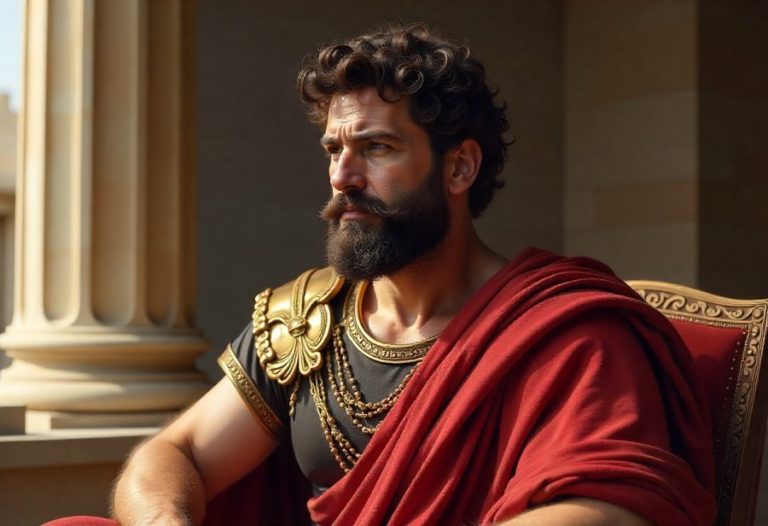Step into the captivating world of Cleopatra VII, a leader whose brilliance extended far beyond her legendary beauty. Was she merely a queen, or a master strategist shaping the tides of history? Her reign was a complex tapestry woven with political cunning, cultural mastery, and daring alliances. From her early struggles to reclaim her throne through clever diplomacy with Julius Caesar to her strategic partnership with Mark Antony, Cleopatra’s ability to adapt and manipulate regional power dynamics defined her legacy. Her mastery of soft power—using charm, cultural patronage, and perception—allowed her to project strength in a tumultuous era dominated by Rome. But what truly made her enduring? Was it her resilience, her unmatched intelligence, or her talent for inspiring loyalty across factions? As her story unfolds, readers are invited to explore how her innovative leadership and mastery of influence forged a legacy that continues to resonate centuries later, challenging notions of power, perception, and cultural identity.
Cleopatra VII: A Visionary Leader Who Shaped History
Cleopatra VII stands out as one of history’s most compelling figures, not just for her striking beauty but for her sharp mind and commanding presence. Her leadership during a period of intense political upheaval showcased her as a visionary ruler capable of shaping her destiny through intelligence and strategic thinking. Cleopatra’s ability to navigate the complex landscape of internal rivalries and external threats highlights her resilience and keen understanding of power dynamics. Her reign was marked by diplomacy, cultural savvy, and an astute grasp of political influence, which allowed her to maintain her throne against formidable odds.
As the last active ruler of ancient Egypt, Cleopatra’s impact extended far beyond her lifetime. She was more than a monarch—she was a master diplomat who understood that perception and cultural influence could wield as much power as armies. Her relationships with Julius Caesar and Mark Antony were carefully crafted political moves, designed to secure Egypt’s independence and strengthen her position. These alliances weren’t just personal attachments; they were strategic maneuvers that demonstrated her ability to combine charm, wit, and tact in pursuit of her goals.
Cleopatra’s legacy is rooted in her remarkable adaptability. She blended Egyptian traditions with Hellenistic influences, creating a unique cultural identity that reinforced her authority. Her mastery of soft power—using persuasion, cultural patronage, and diplomatic finesse—enabled her to outmaneuver rivals and project Egypt’s strength across the Mediterranean. Even in defeat, her resilience and capacity to shape her story have cemented her place as a legendary figure, inspiring generations with her intelligence and determination.
Her leadership style was characterized by bold gestures and memorable moments, like her dramatic meetings with Julius Caesar and her strategic alliance with Mark Antony. These weren’t just personal choices—they were calculated moves to bolster her power and defend her kingdom. Cleopatra understood the importance of perception, often using her charisma and wit to sway allies and influence regional politics. Her ability to craft her image as both formidable and approachable played a key role in her enduring influence.
Beyond her personal story, Cleopatra’s influence on Egyptian identity and regional politics remains profound. She fostered a vibrant cultural scene that combined native Egyptian and Greek traditions, strengthening her legitimacy and unifying her diverse subjects. Her diplomatic skill in managing internal factions and external alliances helped Egypt resist external pressures longer than many expected. Cleopatra’s leadership exemplifies how intelligence, cultural understanding, and resilience can leave a legacy that endures through centuries, reminding us that true influence stems from strategic vision and adaptability.
From Ptolemaic Dynasty to Power: Cleopatra’s Origins and Rise
Cleopatra VII was born around 69 BC into the Ptolemaic dynasty, a Greek family that had ruled Egypt for nearly three centuries. Her ancestors descended from Ptolemy I, one of Alexander the Great’s generals, who took control of Egypt after Alexander’s death and established a Greek-speaking ruling class. From a young age, Cleopatra was groomed for leadership amid a court filled with rivalries and shifting alliances. Her early years were shaped by internal disputes and external threats, sharpening her political instincts and strategic mindset.
When her father, Ptolemy XII, died in 51 BC, Cleopatra ascended to the throne at just 18. Her rise was complicated by Egypt’s fragile position—caught between the waning influence of Hellenistic culture and the expanding power of Rome. The Ptolemaic court was rife with factional disputes, making her task of consolidating power a delicate balancing act. Recognizing that her survival depended on diplomacy, Cleopatra quickly learned to navigate these internal challenges with skill and tact.
Externally, Egypt faced increasing pressure from Rome, which was expanding across the Mediterranean. As Roman influence grew, Cleopatra’s challenge was to preserve Egypt’s independence while managing external threats. She adopted a pragmatic approach, forging alliances through diplomacy and cultural influence, and leveraging her intelligence to outmaneuver rivals inside her court and neighboring states. Her alliance with Julius Caesar in 48 BC was a pivotal move, helping her reclaim her throne after a brutal conflict with her brother Ptolemy XIII.
Her relationship with Caesar was more than personal; it was a strategic effort to secure her position and Egypt’s sovereignty. After Caesar’s assassination in 44 BC, Cleopatra shifted her focus to Mark Antony, forming a new alliance aimed at countering Rome’s dominance. These relationships showcased her ability to adapt and manipulate regional power dynamics, turning personal diplomacy into a tool for her kingdom’s survival. Throughout her reign, Cleopatra expertly balanced internal governance with external diplomacy, helping Egypt withstand the tumult longer than many expected.
Mastering Strategy: Cleopatra’s Tactics in Diplomacy, Politics, and Warfare
Cleopatra’s leadership was defined by her mastery of strategic tactics across diplomacy, politics, and military affairs. She was a keen negotiator who understood that alliances—whether through marriage, diplomacy, or cultural influence—were vital tools for maintaining her power. Her unions with Julius Caesar and Mark Antony weren’t just personal relationships; they were carefully crafted political strategies designed to bolster Egypt’s stability and her own authority. By securing military support and political legitimacy through these alliances, she transformed personal rapport into formidable leverage.
Her diplomatic approach went far beyond marriage. Cleopatra skillfully used art, language, and cultural patronage to foster loyalty among her supporters and allies. Presenting herself as both Egyptian and Greek, she bridged cultural divides and appealed to diverse factions within her court. This dual identity allowed her to unify her kingdom internally while projecting Egypt’s strength externally, especially in a region increasingly dominated by Rome.
Military strength was never her primary focus, but Cleopatra was prepared to deploy her forces when necessary. She understood that military action alone wouldn’t guarantee her survival, so her decisions were guided by intelligence and precise timing. Her naval strategies, particularly during the Battle of Actium, demonstrated her tactical awareness—even if she ultimately faced defeat. Her willingness to engage militarily underscored her resolve to defend her sovereignty, using force as a last resort when diplomacy faltered.
What set Cleopatra apart was her ability to adapt swiftly to shifting circumstances. When her initial alliances wavered, she shifted her approach seamlessly. Her alliance with Julius Caesar helped her reclaim her throne amid internal chaos, and her relationship with Mark Antony was similarly strategic, aiming to counter Roman dominance. Each move reflected her deep understanding of regional power dynamics and her capacity to exploit her opponents’ weaknesses.
Managing internal factions was equally crucial. Cleopatra skillfully balanced competing interests among Greek aristocrats, Egyptian traditionalists, and her court advisors. Her support consolidation efforts prevented rivals from gaining influence and kept her in power despite constant external threats. This internal diplomacy was as vital as her external alliances, creating a stable foundation that prolonged her reign far beyond expectations.
Her ability to shape perceptions through charisma and strategic communication was another key to her success. Cleopatra understood that her image—both as a formidable ruler and an approachable leader—could influence regional politics and sway powerful allies. Her legendary public persona, combined with her tactical moves, allowed her to navigate a treacherous political landscape, reinforcing her influence and ensuring her legacy endured.
Her strategic acumen extended beyond individual battles and alliances, encompassing her ability to shape Egypt’s long-term sovereignty. By leveraging cultural diplomacy and political intelligence, Cleopatra remained a formidable force in a volatile region. For a deeper understanding of her complex strategies and legacy, explore more about Cleopatra’s strategies in diplomacy and warfare.
Commanding Influence: Cleopatra’s Power, Cultural Legacy, and Regional Impact
Cleopatra VII’s influence extended far beyond her role as a monarch; she was a master architect of Egypt’s place in the regional and political landscape of the Mediterranean. Through her clever diplomacy, strategic alliances, and cultural patronage, she projected Egypt’s strength and worked tirelessly to preserve its independence amid the rising dominance of Rome. Her ability to leverage her position and navigate complex regional politics made her a formidable figure whose impact resonated long after her reign.
Culturally, Cleopatra fostered a vibrant environment that fused Egyptian traditions with Hellenistic influences. By supporting arts, learning, and religious practices, she reinforced her legitimacy and cultivated loyalty among her diverse subjects. This cultural blending not only unified her people but also elevated Egypt’s prestige across the Mediterranean, leaving a lasting imprint on its identity and global reputation.
Her mastery of diplomacy was evident in her relationships with Rome’s most influential leaders—Julius Caesar and Mark Antony. These alliances were carefully crafted, serving strategic purposes beyond personal affection. Cleopatra used marriage, cultural exchanges, and negotiations to expand her influence and protect Egypt’s sovereignty, transforming external support into internal stability. Her keen perception and timely moves allowed her to shape regional politics to her favor, often turning potential threats into opportunities.
Within Egypt, Cleopatra skillfully balanced internal factions—Greek aristocrats, Egyptian traditionalists, and court advisors—ensuring her power remained unchallenged. Her support consolidation kept rivals at bay and maintained stability amid external pressures. This internal diplomacy was crucial for her long-term rule, demonstrating her understanding that true strength lay in unity and strategic management of her diverse realm.
Cleopatra also understood the power of perception. Her legendary charisma and image—both as a fierce yet approachable ruler—were tools she wielded to influence allies and opponents alike. Her ability to craft her public persona, combined with her tactical decisions, reinforced her authority and helped her navigate treacherous political waters.
Today, Cleopatra endures as a symbol of leadership rooted in cultural intelligence, resilience, and strategic influence. Her legacy teaches that influence depends not just on power but on the art of perception, relationship-building, and adaptability. Her story continues to inspire those who understand that lasting impact stems from a blend of soft power, strategic vision, and unwavering resilience.
Alliances and Intrigue: Cleopatra’s Strategic Relationships with Rome’s Titans
Cleopatra’s alliances with Julius Caesar and Mark Antony were central to her strategy of safeguarding Egypt’s independence amid the tumult of regional power shifts. Her relationship with Caesar, beginning around 48 BC, was as much political as it was personal. She skillfully used her charm and wit to secure her throne after a brutal struggle with her brother Ptolemy XIII. The dramatic story of her arriving in Alexandria wrapped in a carpet was no mere theatrical stunt; it was a calculated move to garner Caesar’s favor and demonstrate her resourcefulness. This alliance provided crucial military support and political legitimacy, allowing her to reassert her authority in a time of chaos.
After Caesar’s assassination in 44 BC, Cleopatra turned her focus to Mark Antony, recognizing that forming a new alliance with Rome’s most influential figure could shield her realm from collapsing into chaos. Their relationship was rooted in mutual political interests, but Cleopatra also cultivated personal diplomacy—using cultural exchanges, negotiations, and shared military ambitions to strengthen their bond. Her alliance with Antony was a strategic move to counter Rome’s ever-encroaching dominance and protect Egypt’s sovereignty from external threats.
Throughout her dealings with Rome’s leaders, Cleopatra was committed to defending Egypt’s independence. She employed marriage alliances as strategic tools, but her influence extended beyond personal ties. Cleopatra’s diplomacy was subtle and sophisticated, often involving negotiations and cultural diplomacy that presented Egypt as a valuable partner rather than a subordinate. Her ability to shape her image—projecting strength and charm simultaneously—allowed her to sway powerful Roman figures and maintain her authority at home.
Her perception management was a masterstroke. Cleopatra understood that her image—both as a formidable ruler and an approachable leader—could influence regional politics and sway her allies. By carefully shaping her narrative and leveraging her charisma, she navigated treacherous political waters and kept her kingdom afloat amid Roman expansion. Her moves were always calculated, ensuring her influence remained intact even as external pressures intensified.
Yet, reliance on Roman support carried inherent risks. Her fate became increasingly tied to the shifting fortunes of her Roman allies. Still, Cleopatra’s bold partnerships and strategic diplomacy exemplify her ability to turn potential vulnerabilities into sources of strength. Her alliances weren’t just about personal affection—they were vital acts of statecraft, designed to extend her influence and defend Egypt’s sovereignty in a hostile environment.
In the end, Cleopatra’s relationship with Rome reveals a leader who mastered the art of influence through persuasion, timing, and cultural savvy. Her ability to forge powerful alliances while maintaining her independence demonstrates her exceptional skill as a diplomat and strategist. Her legacy underscores that true leadership often depends on the delicate balance of strength, perception, and adaptability—lessons that resonate even today.
Enduring Legacy: How Cleopatra’s Influence Continues to Shape Leadership and Culture
Cleopatra’s influence extends far beyond her reign, shaping how leadership, diplomacy, and cultural identity are understood even today. Her mastery of soft power—using charm, cultural patronage, and strategic alliances—showed that influence often depends more on perception and relationships than on military might. By skillfully navigating complex regional politics and fostering loyalty through cultural understanding, she elevated Egypt’s status to a formidable regional power capable of shaping history’s course. Her approach to leadership, rooted in intelligence and adaptability, continues to inspire those who recognize that true influence relies on nuanced diplomacy and emotional intelligence.
Her resilience in maintaining Egypt’s independence amid Rome’s expanding dominance offers a lasting lesson in strategic patience and flexibility. Cleopatra understood that projecting strength was not enough; internal cohesion was vital. Her ability to balance diverse factions and leverage external alliances kept her kingdom afloat longer than many expected. This internal stability, combined with her external diplomatic efforts, created a resilient foundation that allowed her to extend her influence well beyond her lifetime. Cleopatra’s leadership exemplifies how patience and strategic negotiation can forge a legacy that endures through centuries.
Culturally, Cleopatra played a pivotal role in forging a unique Egyptian identity that blended Greek and native traditions. Her patronage of arts, learning, and religious practices fostered a cultural fusion that reinforced her legitimacy and cultivated loyalty across her diverse subjects. This synthesis elevated Egypt’s prestige and created a vibrant, enduring cultural scene that still resonates today. Her ability to unify her people through shared cultural symbols helped safeguard her legacy as a ruler who understood the power of cultural influence, not just political or military might.
Her mastery of perception—crafting her public persona as both formidable and approachable—was a strategic tool that significantly amplified her influence. Cleopatra knew that how she was seen could sway allies and enemies alike. Her legendary charisma, combined with carefully managed narratives, allowed her to shape regional politics and maintain her authority amid constant threats. This artful manipulation of perception set a precedent for future leaders, demonstrating that influence often hinges on storytelling and emotional connection as much as on tangible power.
Despite ongoing debates about her personal motives and internal control, Cleopatra’s story underscores the importance of adaptability, cultural intelligence, and strategic influence. Her life shows that leadership is not solely about authority but about inspiring loyalty, shaping narratives, and navigating the web of human relationships. Her legacy remains a testament to the idea that resilience, combined with soft power and perceptive leadership, can create a lasting impact that transcends time.
Today, Cleopatra’s example continues to inspire modern leaders and strategists. Her ability to wield influence through diplomacy, cultural savvy, and resilience highlights that effective leadership depends on the art of perception and relationship-building. Her legacy reminds us that lasting impact is often rooted in emotional intelligence and strategic patience—qualities as relevant today as they were in ancient Egypt. Cleopatra’s story is a powerful reminder that true influence is a dynamic, ongoing process rooted in adaptability and human connection.





